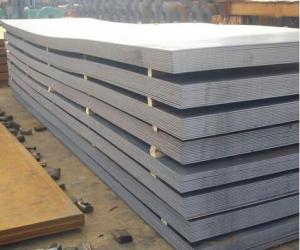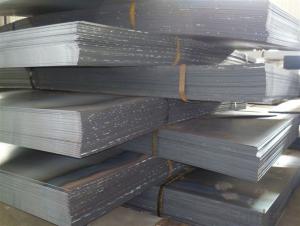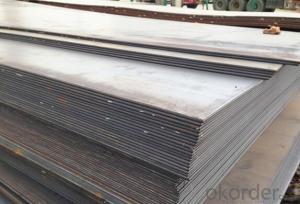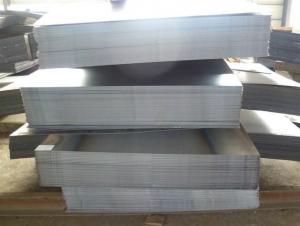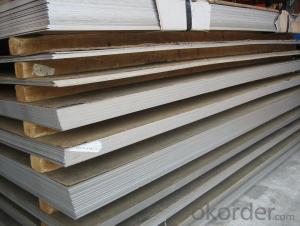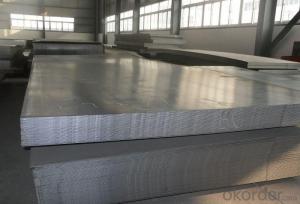Steel Plate_Sheet Weight Grade A36_A516 Gr.60_Gr.70
- Loading Port:
- Tianjin
- Payment Terms:
- TT OR LC
- Min Order Qty:
- 3 m.t.
- Supply Capability:
- 10000 m.t./month
OKorder Service Pledge
OKorder Financial Service
You Might Also Like
Item specifice
Steel Plate_Sheet Weight Grade A36_A516 Gr.60_Gr.70
Thickness:0.6-200mm
Width:1000-4000mm
MOQ: 1 ton
Certificate:ISO,SGS
Specification of Steel Plate_Sheet Weight Grade A36_A516 Gr.60_Gr.70
Commodity | Prime hot rolled carbon steel plate / sheet dimensions |
Thickness | 0.6-200mm |
Width | 1000-4000mm |
Length | as custom's request |
Technique | Cold rolled or hot rolled mild steel plate |
Surface treatment | Bare, galvanized coated or as customer's requirements. |
Standard | ASTM,EN,GB,JIS |
Material | A283Gr.D/A573Gr.65,A516Gr65,A516Gr70,A284Gr.D SS400,SS300,CCSB A36,A32,LRA32,LRB,Q235 SAE1010,SAE1020,SAE1045,Q195,Q235,Q345,SS400,ASTM A36,E235B mild steel plate |
Usage | the mild steel plate will used in home appliances construction, machinery manufacturing, container manufacturing, shipbuilding, bridges, etc. |
Terms of Payment | 30% T/T as deposit and 70% T/T balance againest B/L copy. |
Delivery Detail | Within 3-15 days after receipt of deposited for the mild steel plate |
CNBM Introduction of Steel Plate_Sheet Weight Grade A36_A516 Gr.60_Gr.70
CNBM International Corporation is the most import and export platform of CNBM group(China National Building Material Group Corporation) ,which is a state-owned enterprise, ranked in 270th of Fortune Global 500 in 2015.
With its advantages, CNBM International are mainly concentrate on Cement, Glass, Iron and Steel, Ceramics industries and devotes herself for supplying high quality series of refractories as well as technical consultancies and logistics solution.
After-sale service |
|
Advantages
|
|
Packaging & Delivery of Steel Plate_Sheet Weight Grade A36_A516 Gr.60_Gr.70
Packaging Detail | Sea worthy packing /as per customer's packing instruction |
Delivery Detail | 15 ~ 40 days after receiving the deposit |
Products
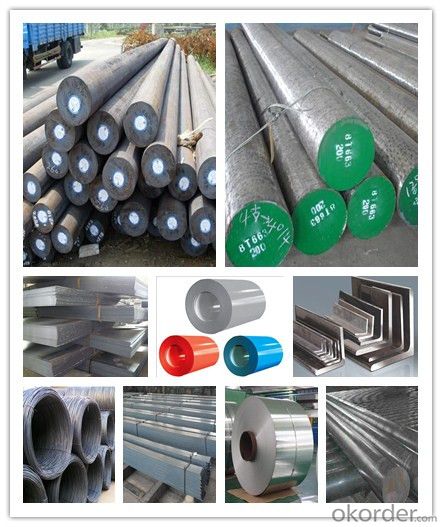
FAQ:
Are you a trading company or manufacturer? | Manufacturer |
What’s the MOQ? | 3 metric ton |
What’s your delivery time? | 15-35 days after downpayment received |
Do you Accept OEM service? | Yes |
what’s your delivery terms? | FOB/CFR/CIF |
What's the Payment Terms? | 30% as deposit,70% before shipment by T/T |
Western Union acceptable for small amount. | |
L/C acceptable for large amount. | |
Scrow ,Paybal,Alipay are also ok | |
Why choose us? | Chose happens because of quality, then price, We can give you both. Additionally, we can also offer professional products inquiry, products knowledge train (for agents), smooth goods delivery, excellent customer solution proposals. |
What's your available port of Shipment? | Main Port, China |
What’s your featured services? | Our service formula: good quality+ good price+ good service=customer's trust
|
Where are your Market? | Covering more than 160 countries in the world |
- Q:What are the future trends and innovations expected in special steel production?
- The special steel production industry is anticipated to undergo significant changes in the future. Several trends and innovations will shape this industry, and the following key areas are expected to see advancements: 1. Advanced Manufacturing Techniques: Special steel manufacturers will likely adopt advanced manufacturing techniques, such as additive manufacturing (3D printing) and digitalization. These technologies will facilitate the production of complex geometries, minimize waste, and allow for customization of special steel products. 2. Sustainable Production: Due to growing environmental concerns, there will be a focus on sustainable production methods in the special steel industry. This will involve adopting energy-efficient processes, recycling and reusing materials, and reducing the carbon footprint of steel production. 3. High-Strength and Lightweight Alloys: The demand for lightweight materials in sectors like automotive and aerospace will drive special steel production towards developing high-strength and lightweight alloys. These alloys will enhance performance while reducing component weight, leading to improved fuel efficiency and sustainability. 4. Nanotechnology and Microstructural Engineering: Nanotechnology and microstructural engineering will enhance the properties of special steels. By manipulating materials at the nanoscale, manufacturers can improve strength, toughness, corrosion resistance, and other characteristics. 5. Enhanced Surface Treatments: Advancements in surface treatments, such as coatings, will improve the performance and longevity of special steel products. Innovative surface treatments will offer increased resistance to wear, corrosion, and heat, expanding the range of applications for special steels. 6. Digitalization and Data Analytics: Special steel production will undergo a revolution with the integration of digital technologies and data analytics. Smart factories with interconnected systems will enable real-time monitoring, predictive maintenance, and improved quality control, resulting in higher productivity and efficiency. 7. Automation and Robotics: Automation and robotics will continue to play a vital role in special steel production, optimizing productivity, reducing human errors, and improving worker safety. This will enhance overall operational efficiency. 8. Industry 4.0 Integration: The special steel industry will embrace Industry 4.0 principles, including the Internet of Things (IoT) and artificial intelligence (AI). These technologies will enable seamless connectivity, intelligent decision-making, and predictive analysis, leading to improved productivity, cost-effectiveness, and competitiveness. In conclusion, the future of special steel production will be shaped by advancements in manufacturing techniques, sustainable practices, material engineering, digitalization, and automation. These innovations will not only enhance the performance and quality of special steel products but also contribute to a more sustainable and efficient industry.
- Q:What are the main elements in special steel alloys?
- The main elements in special steel alloys vary depending on the specific alloy, but commonly include elements such as chromium, nickel, molybdenum, and vanadium. These elements are added to enhance the properties of steel, such as corrosion resistance, strength, hardness, or heat resistance, making them suitable for specific applications in industries such as aerospace, automotive, and construction.
- Q:How is special steel used in the packaging industry?
- Special steel is used in the packaging industry for a variety of applications such as manufacturing durable and corrosion-resistant containers, packaging machinery, and tools used in the packaging process. It provides strength, reliability, and longevity, ensuring the safety and protection of products during storage and transportation.
- Q:How does special steel contribute to the renewable energy storage?
- Special steel plays a significant role in renewable energy storage by providing essential components for various energy storage technologies. For instance, it is used in the manufacturing of high-capacity batteries, such as lithium-ion batteries, which are crucial for storing energy from renewable sources like solar and wind. Additionally, special steel is used in the construction of wind turbine towers and solar panel frameworks, ensuring their durability and reliability. Overall, special steel contributes to the efficient and reliable storage of renewable energy, supporting the growth and sustainability of the renewable energy sector.
- Q:Can special steel be used in the semiconductor industry?
- Yes, special steel can be used in the semiconductor industry. Special steel, such as stainless steel, is often used in the semiconductor industry due to its excellent corrosion resistance, high temperature resistance, and low contamination properties. It is commonly used in various components and equipment used for semiconductor fabrication and processing.
- Q:How is special steel recycled?
- Special steel is typically recycled through a process called electric arc furnace (EAF) steelmaking. In this process, scrap steel is collected and melted down in an electric arc furnace, where high temperatures are used to separate impurities. Once the impurities are removed, the molten steel is then refined and cast into new forms to create various specialized steel products, ensuring that the steel is effectively recycled and reused.
- Q:What are the specific requirements for special steel used in the mining industry?
- To ensure the durability, strength, and resistance to harsh conditions of special steel used in the mining industry, certain requirements must be met. Key requirements for this type of steel include: 1. High tensile strength is necessary to withstand heavy loads and resist deformation under extreme conditions. This enables the steel to endure the pressure, impact, and stress encountered during mining operations. 2. Excellent wear resistance is essential to prevent premature failure and increase the lifespan of mining equipment in abrasive environments. Rocks and ores can cause significant wear on the equipment. 3. High corrosion resistance is crucial in highly corrosive mining environments, such as underground mines or areas near water bodies. The steel should be able to withstand exposure to chemicals, moisture, and other corrosive agents to prevent rusting, pitting, and other forms of corrosion that weaken the steel. 4. Excellent toughness is required to withstand heavy impacts and vibrations that mining equipment is subjected to. If the steel is not tough enough, fractures can occur. The steel must be able to absorb energy from impacts and vibrations without fracturing, ensuring the safety and reliability of the equipment. 5. Good heat resistance is necessary to withstand high-temperature mining operations, such as smelting and refining processes. The steel should not lose its strength or undergo deformation under elevated temperatures. 6. Good machinability is important to allow for easy formation of complex shapes or structures. This facilitates the manufacturing process of mining equipment and components. Overall, meeting these requirements is crucial for ensuring the reliability, durability, and safety of mining equipment in demanding mining environments.
- Q:Can special steel be used in the manufacturing industry?
- Yes, special steel can be used in the manufacturing industry. Special steel refers to various high-quality and specialized alloys that possess unique properties, such as high strength, corrosion resistance, heat resistance, and wear resistance. These properties make special steel suitable for a wide range of applications in the manufacturing industry, including the production of machinery, tools, automotive components, aerospace parts, and construction materials.
- Q:How long does special steel typically last in various applications?
- The lifespan of special steel in various applications can vary depending on several factors. Special steel is known for its exceptional strength, durability, and resistance to corrosion, making it suitable for a wide range of applications. However, the actual lifespan of special steel will depend on the specific application, maintenance practices, and environmental conditions it is exposed to. In general, special steel can last for several decades or even longer when used in industries such as construction, automotive, aerospace, and manufacturing. For instance, in building structures, special steel can last for 50 to 100 years, thanks to its robustness and ability to withstand extreme loads and weather conditions. In automotive applications, special steel components like engine parts, suspension systems, and body frames can have a lifespan of 15 to 30 years, given that they are properly maintained and not subjected to excessive wear and tear. When it comes to the aerospace industry, special steel is commonly used in critical components like turbine blades, landing gears, and fuselage structures. These parts undergo rigorous testing and inspection procedures and are designed to last for decades, typically around 30 to 50 years, before requiring replacement or refurbishment. In manufacturing processes, special steel tools and dies can have a lifespan ranging from a few years to several decades, depending on the intensity of use, the material being processed, and the maintenance practices employed. Proper lubrication, cooling, and regular maintenance can significantly extend the lifespan of these tools. It is important to note that the lifespan of special steel can be adversely affected by factors such as exposure to harsh chemicals, high temperatures, aggressive environments, or inadequate maintenance. Therefore, regular inspections, maintenance, and adherence to recommended usage guidelines are crucial in ensuring the longevity of special steel in various applications.
- Q:What are the main alloying elements in special steel?
- The main alloying elements in special steel are chromium, nickel, molybdenum, vanadium, and tungsten.
1. Manufacturer Overview |
|
|---|---|
| Location | |
| Year Established | |
| Annual Output Value | |
| Main Markets | |
| Company Certifications | |
2. Manufacturer Certificates |
|
|---|---|
| a) Certification Name | |
| Range | |
| Reference | |
| Validity Period | |
3. Manufacturer Capability |
|
|---|---|
| a)Trade Capacity | |
| Nearest Port | |
| Export Percentage | |
| No.of Employees in Trade Department | |
| Language Spoken: | |
| b)Factory Information | |
| Factory Size: | |
| No. of Production Lines | |
| Contract Manufacturing | |
| Product Price Range | |
Send your message to us
Steel Plate_Sheet Weight Grade A36_A516 Gr.60_Gr.70
- Loading Port:
- Tianjin
- Payment Terms:
- TT OR LC
- Min Order Qty:
- 3 m.t.
- Supply Capability:
- 10000 m.t./month
OKorder Service Pledge
OKorder Financial Service
Similar products
New products
Hot products
Related keywords
